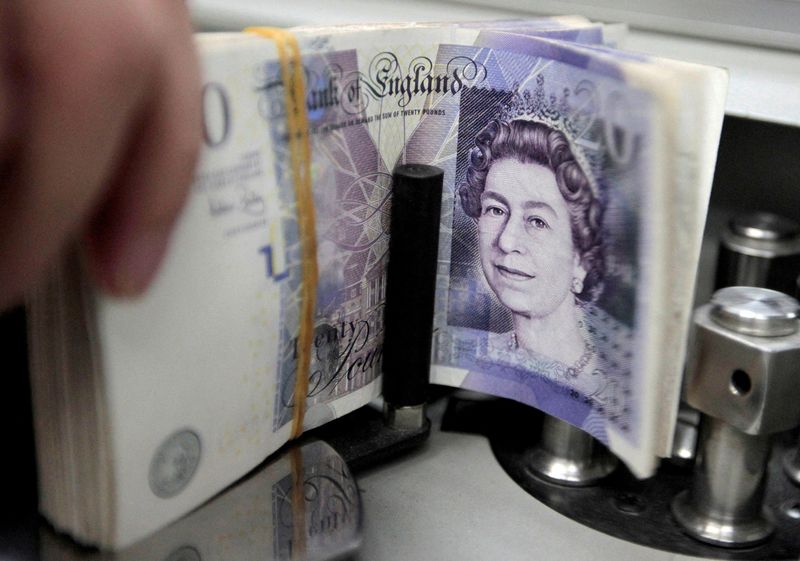By Harry Robertson and Amanda Cooper
LONDON (Reuters) - Sterling fell to its lowest since late May, while UK government bonds and stocks rallied on Wednesday as data showing inflation slowed more than expected in August raised the possibility that the Bank of England could pause rate hikes this week.
British annual consumer price inflation fell to 6.7% last month. Economists polled by Reuters had forecast CPI would rise to 7.0% from July's 6.8% after a jump in fuel prices and an increase in a tax on alcoholic drinks.
Sterling was last down 0.23% on the day at $1.2363, having fallen to as low as $1.2334 just after the data, its lowest since May 30.
That fall came as investors scrambled to reel in bets that the BoE will raise interest rates again on Thursday.
Traders think there's a 60% chance the Bank leaves rates unchanged, up from 20% on Tuesday, according to pricing in derivatives markets.
They now see a 40% chance of a 25-basis-point increase to 5.5%, an outcome which was priced as a near-certainty only a month ago.
In bond markets, interest rate-sensitive two-year gilt yields slid 14 bps to 4.86% as investors rushed into British bonds, putting it on track for the biggest daily fall since Aug. 23. Yields move inversely to prices.
The benchmark 10-year Gilt yield was last down 9 bps at 4.254%. It earlier fell to 4.239%, the lowest since late July.
Goldman Sachs (NYSE:GS) added to a bullish feeling in UK bond and equity markets after it said it now thinks the BoE is already finished hiking rates.
Britain's FTSE 100 stock index was last up 0.8% and the FTSE 250 index of mid-sized companies was 1.44% higher. Both were outperforming the 0.63% rise in the pan-European STOXX 600 gauge.
"The August inflation print surprised meaningfully to the downside, particularly on core and services inflation," Goldman economists, led by Sven Jari Stehn, said in a research note.
"Combined with their recent dovish commentary, we now expect the MPC to keep Bank Rate unchanged tomorrow and lower our forecast for the terminal policy rate to 5.25% (from 5.5% before)," Goldman's team said, referring to the BoE's monetary policy committee.
Core inflation slowed sharply to 6.2% year-on-year from 6.9% in July. The measure strips out volatile food and energy prices and policymakers and investors see it as a guide to underlying price pressures.
Many analysts said they still expected one final hike on Thursday, however.
Consumer price inflation is still running well over three times its 2% target and Britain has the highest rate of inflation among major economies.
"It remains our house view that a rate hike is likely, though certainly the odds that a pause will follow have risen," said Jane Foley, senior FX strategist at Rabobank.

Foley said the pound could even get some support from investors now that inflation is slowing quicker than expected, a positive outcome for the UK economy.
Kim Crawford, global rates portfolio manager at JPMorgan (NYSE:JPM) Asset Management, said: "The Bank of England's decision is more finely balanced as activity data weakens more clearly, but a pause at this meeting could backfire... Wage growth has still continued to surprise to the upside."